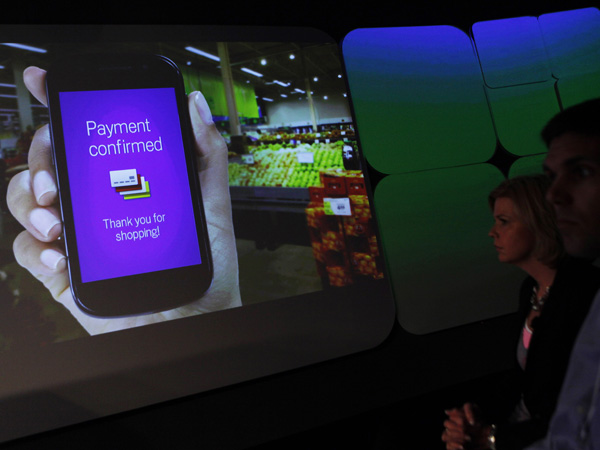[人们将不再会使用现金和信用卡. 新的支付方式将会是智能手机.以后的世界很微妙]
By Dan Tynan
May 26, 2011, 2:26 PM —

Attendees watch a demonstration of the Google wallet application screen during a news conference unveiling the mobile payment system.
参观者注视着谷歌移动支付系统展示屏
Source: REUTERS/Shannon Stapleton
Like it or not, your smart phone is turning into your wallet. And if Google has anything to say about it, you’ll be spending gDollars on your gPhones.
Today, to the surprise of practically no one, Google announced Google Wallet, a mobile payments system using the Near Field Communications technology built into certain Android smart phones.
Soon you may be able to wander into your nearby Quickie Mart and wave your Android phone at the register to pay for that six pack of Modelo Especial and bag of Doritos Cool Ranch chips.
For now, though, the “tap-to-pay” system is taking baby steps. Google Wallet will only be available as a trial in New York and San Francisco, and will work only on Samsung Nexus S 4G phones at select retailers using MasterCard PayPass terminals.
But it’s inevitable. Everyone in the financial sector is working on frictionless forms of commerce, and the smart phone is the logical place to put them. You might as well mark today as the day cash died and traditional credit cards went on life support.
[ See also: My application to become a Facebook ambassador. ]
Why? Two reasons. One is that bits are much cheaper than molecules and easier to upgrade or replace. No cards to mail out, no postage, etc. So banks will be able to charge the same transactions fees while incurring much lower overhead. The second is the wealth of data that gets generated when you purchase something, much of which goes uncaptured or poorly used. Everybody wants at that, especially Google.
Let’s think about that purchase of Modelo and Doritos. Today, that is probably a straight cash transaction only you and the slacker behind the counter know about, and he’s probably too stoned to remember.
If you bought that with your smart phone, a whole mess of people will be able to remember it.
The store, for example, could aggregate that information to determine that a lot of people are buying Modelo and Doritos at the same time, and may display them closer together inside the store. Or it may determine the demand for Modelo and Doritos spikes after 11 pm and institute variable pricing, charging more for it in the wee hours than it does in the afternoon.
(It may also fire that stoner/slacker employee. In the new frictionless economy, we won't need cash register jockeys.)
Google could take that information and, via its new Google Offers service, send you a coupon for your next purchase. Or Google could use its AdMob subsidiary to send your phone ads for competing products like Corona and Fritos. (And Apple, which will surely offer NFC payments at some point for the iPhone and iPad, could do the same with its Quattro mobile ad service.)
This type of thing already happens in a limited way with supermarket frequent shopper cards; soon it will happen with everything.
Your bank could collect that purchase information and sell it to data brokers, who in turn could sell it to whomever might show an interest. Alcohol and high sodium foods are certainly not good for you -- that’s information your health care provider might be willing to pay for (kiss those “healthy eating” discounts goodbye). Wait, aren’t you in AA? Your estranged spouse’s attorney might be very curious as to what you’re about to do with that six pack. And so on.
I’m not saying all of this will happen. I’m just saying there’s nothing to stop it from happening. When all transactions are traceable – and cash payments become the kind of thing only the very poor or the very criminal rely on -- all kinds of things can happen to that data. Some will be highly convenient; others, not so much.
I won’t even get into the security issues this raises, though it’s pretty clear smart phones just became an even more tempting target for hackers.
But, like I said earlier, frictionless tap-to-pay systems are inevitable. Best to go into them with your eyes wide open.
文章连接:http://www.itworld.com/it-managementstrategy/168775/google-wants-be-your-wallet